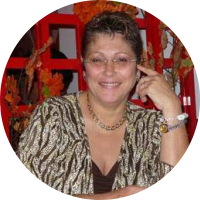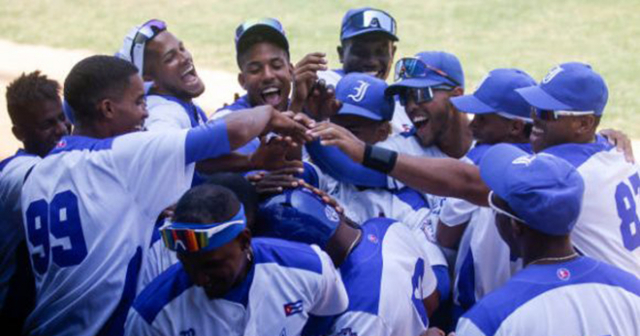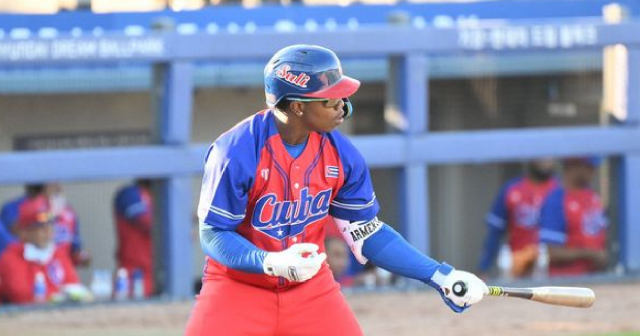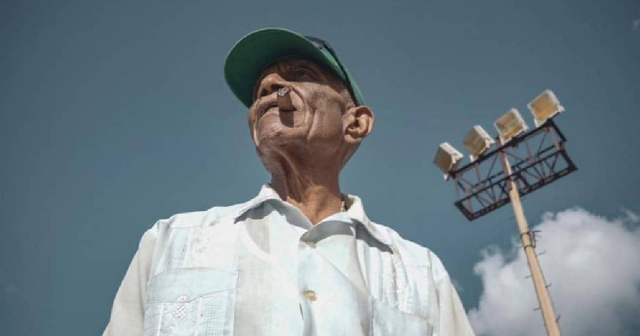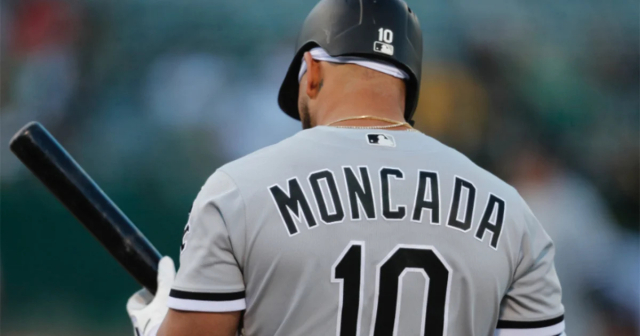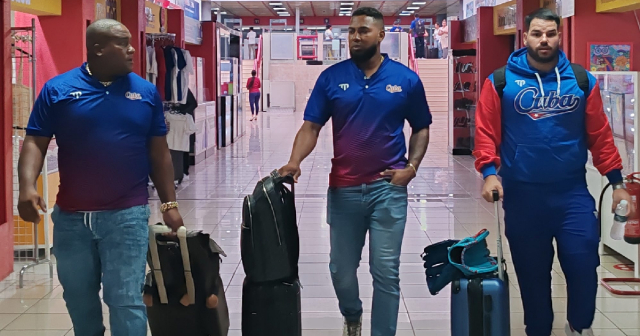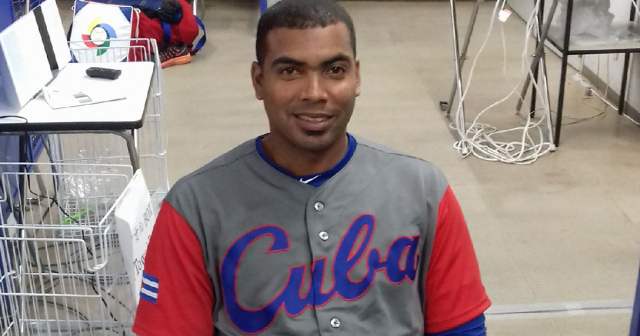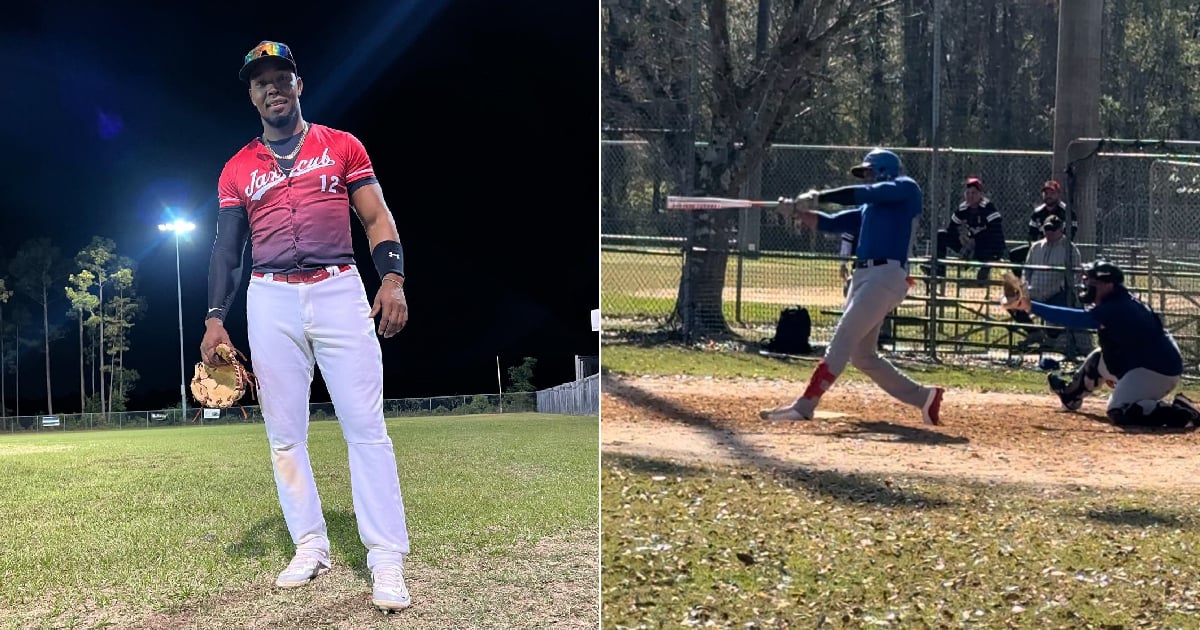
As happens at times with great players, their potential is not always fully utilized; they are not recognized despite their greatness. Right-handed hitter with power, effective hitting against left-handed pitchers, always getting on base, fast on the bases, excellent defense in the outfield and at third base, Jefferson Delgado is one of those who could have had more history if he had been considered.
Born in the town of Santo Domingo, in Villa Clara, he stands out playing for Matanzas. Just seeing him standing at home plate was impressive, and his hits thrilled the crowd with the power they carried.
Today, after some time, I meet him in the United States, and it is a great pleasure for me to interview him and thank him for his kindness, as he is very short on time, busy with other tasks, during the 15th birthday of his beloved daughter.
Beginnings in Villa Clara, always baseball, didn't you practice other sports? When and why did you go to play for Matanzas?
I was born in Santo Domingo, I was a neighbor of the tugboat Ariel Borrero, but my sports life was in Matanzas.
What do you like most about baseball, hitting, fielding, or running?
I like everything about baseball; I enjoy hitting and fielding. After Yuli Gurriel left, I was able to achieve several Gold Glove awards, a Silver Bat, best third baseman in Cuba, and I was the batting leader above .400; in other words, I had success, and what I was missing was to be a national champion, which I became with Matanzas when Armando Ferrer was the manager.
How does an amazing player like you feel when you see that you are not recognized as you should be?
What do you want me to say? When I started with Víctor Mesa, I had good results; my first Cuba team was when I attended a tournament in Colombia. After that, I went to the Can-Am League, which had a very good level, and I was always among the top hitters. You know that performing well in an international event guaranteed you more international events, that's how it is.
In almost all of them, I had good results and everything was fine. But then something happened, and for you to understand: a player X was going to the Dominican Republic and in the end, he wasn't signed; he would come back and go straight to the Cuba team just like that, and they would take me out. The justification was that "if he wasn't hitting home runs anymore," he wasn't the right one.
But I did hit a lot of line drives, not home runs, but I did drive in many runs. Every year I drove in 60, 65 runs with 9 or 10 home runs. The leaders in home runs were Avilés, Viñales, Saavedra; they drove in 70 and something runs and hit 20 or more home runs. My production was good, I was driving in runs. So, of course, I started to feel uncomfortable because I was deceived a lot. They took me out of the national team and that was it!... I felt very deceived, I was disappointed.
When they held the first triangular, when they held that Central American event, they formed three teams, and in the Super League..., and I wasn't in any of them; it was all because I had a clash with Víctor Figueroa because we didn't understand each other. The executives from the SoftBank Hawks came to see me, the same Japanese team where Alfredo Despaigne, Liván Moinelo, and Yurisbel Gracial were, because they were interested in me, and we met at the "Victoria de Girón."
Figueroa was the manager, and Wilfredo Menéndez, the commissioner, was also there, along with the gentleman who came from Japan for the SoftBank Hawks. They began to assess Gracial, who was coming off playing shortstop as a third baseman. And what about me?
I respect and admire Gracial, but I was doing very well in third base, and being moved to the outfield when Gracial plays shortstop didn’t seem fair to me. But then he said he felt better at third base, and he told me that I had to be moved to the outfield and treated me very poorly (he knows it): "If you want, you can play in the outfield; if not, you know...". And Gracial is a great athlete, but I also deserve respect, and all I wanted was for him to talk to me, to communicate properly, and we exchanged a few words.
Figueroa didn't put me in to play in the second half; when they asked for reinforcements, he sat me on the bench, I didn't play anymore and my contract fell through because he declared that I was undisciplined and, you know me Julita, you know I'm not like that.
Yes, I was very upset, yes, but at no point did I say I wasn't going to play; I was simply defending my own and I think I had my reasons because many people supported me. So, Figueroa made statements on social media and they interviewed me asking if I was injured, if I had committed any indiscipline, and you know that baseball in Japan is rigorous with that. That's when I lost my contract, and many people don't know that, he even made a little "campaign" against me. In the end, the following year Ferrer took over as manager.
Internationally, you are part of the Cuba team for the IV World Baseball Classic and represented us in the Can-Am League 2017.
In the Classic, I was a starter. That year I achieved the batting title with a .403 in the National Series 56, becoming the sixth player from Matanzas to win a batting title in National Series and the only one to exceed a .400 average.
Also in the SNB 59, I played an important role for Matanzas in winning the championship title, once again becoming the batting leader, this time with a .388 average.
In total, Jefferson participated in 15 National Series and his statistics speak for themselves: in 3,179 at-bats he connected 1,038 hits (43 home runs, 134 doubles, and 17 triples); he drove in 477 runs and scored 500, maintaining an offensive line of .327/.402/.420 (AVG/OBP/SLG)... In 2022, the villaclareño-matancero realized that his future and that of his family were not in Cuba, and thus he embarked on his dream by making the known "journey of the volcanoes" from Nicaragua to the United States.
Do you know how many times I was in the United States and never stayed to have to make that journey later? It hurt me because I had never thought about it, but life forces you. Oh, Julita, scouts even saw me who said they wanted me. One came to see me in New Jersey, he came from New York and told me he had been interested in me since the first Can-Am League where he saw me, that was advanced double A, and that I looked good hitting the ball and very good in defense; that they wanted me for the New York Mets. He gave me a card and told me: "A fellow countryman of yours and you are the ones of interest to us"; the other was Yulieski Gurriel. And they offered me a lot of money and... can you believe it? I said no. And I always returned without problems. Look at where my loyalty and patriotism took me.
I didn't have a house in Cuba, I lived as a tenant with my pregnant wife again and my newborn baby in Los Arabos, and we kept jumping from rental to rental because you couldn't stay more than three months, because if you didn't have rights to the house, you know the laws in Cuba. People would only rent to you for three months; we had a hard time.
While I was at the World Classic, my friends called me: “Hey, I saw your wife with a big belly and the little girl in a car during a move because they took her out of the rental”... I could have stayed and I didn't! We've been married for 20 years and I would call her and she would say: “Don't worry, focus on playing well and I'll take care of the kids and we'll be fine.”
I owe her a lot, and every time I left the country, she would say to me: "When you're coming, call me so we can hit the road and you can see where the new rental is," and it was always like that. Do you know what that is? That uncertainty, that neglect, that abandonment by the sports and political authorities.
That shocked me because I said, "Wow, I'm on the national team, I have results, and I don't even have a small house!" In the end, I was given one in Matanzas, thanks to Roger Machado, because I was a reinforcement in Ciego de Ávila and I had good results there. They treated me very well, and I still have great friendships from that time. Roger met with the provincial leaders and they told me, "If you come to Ciego to play, we’ll give you a house," but the comment leaked, and my wife called me and said, "Hey, come, they gave me the keys to a house," and I stayed in Matanzas. So for me, the house was given to me by Roger… hahaha.
You don't know what we suffered when my little girl would say to me: “Dad, when are we going to live in a house that is truly ours, where no one will kick us out?” When we finally got the housing, I told my wife: “Let the little girl choose her room.” Julita, that house didn't even have closets; it was an apartment that was half-finished, and I had to spend a lot of money.
I mean, if Roger Machado hadn't said that he was taking me to Ciego, they would never have given me anything. I had to leave Cuba because of all that. I was taken out of the national team for no reason and I had a lot of headaches. I told myself, well soon I won't be able to play baseball anymore because no matter how good your physique is, Cuba is exhausting. Those games at two in the afternoon, the terrible food; everything kept deteriorating, with no attention, going through a lot of hardship.
Since there was never any light, we could never play at night; the hard ground, in bad condition, I was not a young kid... I would sit in my house looking at the sea and say, "Come on, this is unbearable!", while prices in the market were rising and people think that a baseball player in Cuba is rich, and I was earning 3,500 Cuban pesos to support the family, which was not even enough for five days.
I had two more series left, if anything, and I saw myself just like “Tati” Valdés, the golden lefty of Cuban baseball, lying there, abandoned, alcoholic, sitting on the curbs.
Víctor Mesa would pick him up, and he would take him on our bus, but Julita, Jorge Luis Valdés would enter the stadium asking for a baseball player’s pants and they wouldn’t give them to him; sometimes they wouldn’t let him in, and when they did let him onto the field, they wouldn’t give him lunch or a snack, and we all shared so he could eat... And he was the best left-handed pitcher in Cuban baseball... What would be left for me when I couldn’t play?
And it wasn't just Tati, I saw greats like Fernando, Isasi... Should I wait for that destiny? That's how I embarked on the journey and here I am, waiting for my residency and helping my family as much as I can.
Right now, I am buying everything I can for my daughter who is turning 15. If I had stayed when I was well, if I had dropped out of the team when I was young, I would be living the life I wanted right now; I would even have returned to Cuba to play on the national team as a hero and full of money because I would have signed with a good team and would be going from here to there.
As has happened to others, like Frederich Cepeda himself, who gave it his all and was left like waste thrown to the side.
That's right. I don't understand how they didn't let Frederich Cepeda make history; he would have been the only player to participate in all the World Classics. They left him out, as if there was so much talent in a team lacking talent; they didn't let him go, and he deserved it. All of this made me go out and seek a better future for myself and my family.
And since you mention the subject, how was your journey?
I left Havana for Nicaragua; from there, Guatemala until I arrived in Mexico, where I stayed for a few days. I left my house on September 5 and entered the United States on September 20 of the same month. I arrived peacefully, without problems, and I'm happy to be able to help my family. I live in Jacksonville, Florida. I work at a company that makes electrical panels; I'm like a warehouse clerk, and it's a good job.
I’m doing very well and I continue to play baseball here in the official league of this place; there are about 14 teams, it's like the National Series of Cuba. There are many talented kids, and this year I finished second in almost everything, I’m happy. I play and work. I'm an entrepreneur: I started a cleaning company that is growing, and in two years I have achieved a lot.
My family is in Cuba, I am here alone, but with God's blessing and everything that supports me, I hope to have them by my side very soon. I have my papers in order, I'm waiting for residency, so everything is moving along.
Julita, when I was coming over here, I told you it was in September, and the kids were starting school; a backpack cost 2,500 pesos and my salary was 3,000 pesos. If I were young… I would be looking for another future in baseball!
What do you think of baseball in Cuba today?
The current Cuban baseball is no secret to anyone that it has lost much of its motivation; the level has dropped extraordinarily, especially with the incessant exodus of talent. It is a different era. A fundamental problem is the lack of motivation, because that should be the support to feed your family and the salary is not enough, nor does it come close to meeting the needs; and that is when they pay on time.
Sports equipment no longer exists, the nutrition of athletes does not match the physical effort. Before, it was looked down upon when people left the country; but that has changed due to the difficult situation in Cuba. One must seek sustenance for the family wherever and however possible, and it is now seen more as an achievement than as a betrayal. It is very complicated to support a family with a meager salary from within the island; you earn very little and everything costs a lot.
Manager you have felt the best with
There are different stages. One is Alfonso Urquiola, who for me is one of the greatest; another is Víctor Mesa, I did not have the best relationship with him, but I learned a lot and owe him a lot. I never had the chance to tell him; it's true that he had very particular methods, but with him, I learned to behave on the baseball field, at home, in a restaurant. He taught us how to conduct ourselves in all areas of life, he taught us good manners, and at that moment we saw it as a punishment; however, it is quite the opposite.
It has helped me a lot in this country that education you gave us, and I will always be grateful because it was shaping us, not just for the baseball field but for life in general.
Today I can pass that education on to my children. The truth is that it was very demanding, and we saw it as a torture because we had to arrive an hour early for training to prepare ourselves, and we certainly criticized it. Now I see it as a lesson; it taught us to think. It told us that the mind controlled everything, and that's how it is.
I hope he can read this interview because it's never too late, and I want to clarify. Once, they misrepresented an interview I gave at the Latinoamericano when I was asked, "And now that Víctor Mesa is not here?" and I replied, "Now we are going to work with less pressure from the people," and the journalist said that the third baseman from Matanzas had said that now that Víctor Mesa was not there, they would be better off, without pressure.
The journalist took it out of context; the only thing he published from the entire interview was that. And it wasn't a secret that wherever Víctor Mesa was, there was pressure from the press and all the media; he has always been very media-savvy, and now Julita, I'm so glad you give me the opportunity to say it publicly! That reporter used me, that hurt me, it made me feel bad. It wasn't what I said. I reiterate, we didn't have the best relations because he was flexible with others, but he was very tough on me, but... there is his help! It was a school, and I say this anywhere.
With another director I have felt good is Armando Ferrer; he was one more of us, always socializing. He was one of us and a good strategist.
What would you do now if you were a young baseball player eagerly seeking a future?
If I were young, I would be driven to go to the so-called "fincas" in the Dominican Republic, in search of a contract from a Major League team that would provide financial security for me and my family, just like all those talented young men are doing. Look, just this week, six have left, including pitchers and infielders and outfielders.
Additionally, I would have been struggling to be good among the good, to be able to tell my children: "I played in the best baseball in the world"... It couldn't be... But I will do everything possible for them to fulfill their dreams and be happy!
What do you think?
COMMENTFiled under:
